Bios255 case study - Study guides, Class notes & Summaries
Looking for the best study guides, study notes and summaries about Bios255 case study? On this page you'll find 42 study documents about Bios255 case study.
Page 4 out of 42 results
Sort by
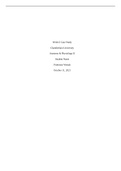
-
BIOS255 Week 6 Case Study; Chronic Obstructive Pulmonary Disease (COPD)
- Other • 3 pages • 2022
-
- $19.49
- + learn more
1. Question: How is ventilation different from respiration? 2. Question: Ventilation is dependent upon a pressure gradient. Describe how this pressure gradient works. 3. Question: What muscles are involved in ventilation? 4. Question: What is COPD and how does it affect ventilation? 5. Question: How does the tripod position help breathing in COPD patients?
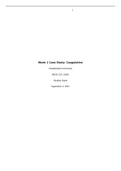
-
BIOS255 Week 1 Case Study; Coagulation
- Other • 3 pages • 2022
-
- $21.49
- + learn more
1. Discuss which clotting factors the PT and PTT test evaluate and whether each test measures the intrinsic or the extrinsic pathways. 2. Describe the common coagulation pathway. 3. Based on Jessie’s test, which factor deficiency do you believe he has and why? 4. Jessie’s clotting factor disease is seen more often in males. Please explain why. 5. If both the PT and the PTT tests were abnormally long, which part of the coagulation pathway would be affected?
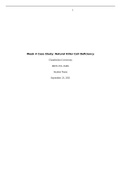
-
BIOS255 Week 4 Case Study; Natural Killer Cell Deficiency
- Other • 3 pages • 2022
-
- $29.99
- + learn more
1. Why are natural killer cells considered to be part of the innate immune response? 2. What types of cells do natural killer cells act against? 3. Describe the process whereby natural killer cells kill other cells and the role of macrophages in the process. 4. The immunologist cautioned Shanice that she may be more susceptible to virally induced cancers. Why did the immunologist state this? 5. What treatments or other options does Shanice have to counteract the natural killer cell deficienc...
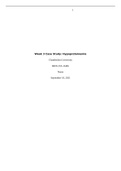
-
BIOS255 Week 3 Case Study; Hypoproteinemia
- Other • 3 pages • 2022
-
- $29.99
- + learn more
1. Describe all the constituents contained in plasma and their concentrations. 2. Explain the liver’s role in production of proteins. 3. Why would albumin be important in regulating pressure at the capillaries? 4. Explain the process of fluid movement at both the arterial and venous side of the capillary. 5. What can Betty do to improve her situation?
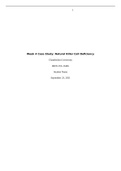
-
BIOS 255 Week 4 Case Study; Natural Killer Cell Deficiency
- Other • 3 pages • 2022
- Available in package deal
-
- $20.49
- + learn more
1. Why are natural killer cells considered to be part of the innate immune response? 2. What types of cells do natural killer cells act against? 3. Describe the process whereby natural killer cells kill othercells and the role of macrophages in the process. 4. The immunologist cautioned Shanice that she may be moresusceptible to virally induced cancers.Why did the immunologist state this? 5. What treatments or other options does Shanice have tocounteract the natural killer cell deficiency?
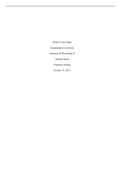
-
BIOS 255 Week 6 Case Study; Chronic Obstructive Pulmonary Disease (COPD)
- Other • 3 pages • 2022
- Available in package deal
-
- $20.49
- + learn more
1. Question:How is ventilation different fromrespiration? 2. Question:Ventilation is dependent upon a pressure gradient. Describe how thispressure gradient works. 3. Question:What muscles are involved inventilation? 4. Question:What is COPD and how does it affectventilation? 5. Question:How does the tripod position help breathing in COPDpatients?
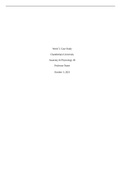
-
BIOS 255 Week 5 Case Study; Hypersensitivity Reactions
- Other • 3 pages • 2022
- Available in package deal
-
- $20.49
- + learn more
1. Manuel is experiencing a hypersensitivity reaction. What are hypersensitivity reactions? 2. Briefly describe the different types of hypersensitivity reactions. 3. What type of hypersensitivity reaction is Manuel likely experiencing and how do you know? 4. Is this an antibody or T-cell mediated response? What class of antibodies or type of T- cells are involved? 5. Why was epinephrine administered and how does epinephrine work in this case?
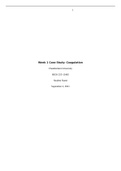
-
BIOS 255 Week 1 Case Study; Coagulation
- Other • 3 pages • 2022
- Available in package deal
-
- $20.49
- + learn more
1. Discuss which clotting factors the PT and PTT test evaluate and whether each test measures the intrinsic or the extrinsic pathways. 2. Describe the common coagulation pathway. 3. Based on Jessie’s test, which factor deficiency do youbelieve he has and why? 4. Jessie’s clotting factor disease is seen more often in males.Please explain why. 5. If both the PT and the PTT tests were abnormally long,which part of the coagulation pathway would be affected?
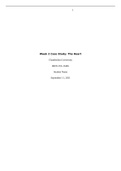
-
BIOS 255 Week 2 Case Study; The Heart
- Other • 3 pages • 2022
- Available in package deal
-
- $20.49
- + learn more
1. What are the four valves found in the heart and where are they located? Give all names of each valve. 2. What is a mitral valve prolapse and what causes this inMarfan’ssyndrome specifically? 3. What happens to blood flow (specifically) with a mitral valveprolapse (where would the blood back up to andwhy)? 4. If a person were to have a prolapse of the tricuspid valve,what specifically would happen to the flow of blood in that case? 5. Do you think Janet will ever play basketball again? W...
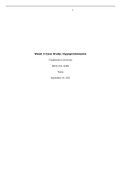
-
BIOS 255 Week 3 Case Study; Hypoproteinemia
- Other • 3 pages • 2022
- Available in package deal
-
- $20.49
- + learn more
1. Describe all the constituents contained in plasma and their concentrations. 2. Explain the liver’s role in production of proteins. 3. Why would albumin be important in regulating pressure atthe capillaries? 4. Explain the process of fluid movement at both the arterialand venous side of the capillary. 5. What can Betty do to improve her situation?

Do you wonder why so many students wear nice clothes, have money to spare and enjoy tons of free time? Well, they sell on Stuvia! Imagine your study notes being downloaded a dozen times for $15 each. Every. Single. Day. Discover all about earning on Stuvia


